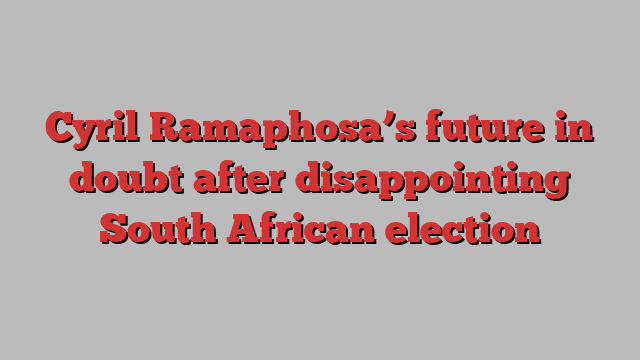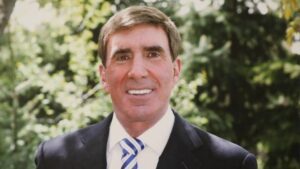
Unlock the Editor’s Digest for free
Roula Khalaf, Editor of the FT, selects her favourite stories in this weekly newsletter.
Senior figures in the African National Congress were on Friday debating the future of President Cyril Ramaphosa and their best option for a coalition partner, as the depth of the loss suffered in South Africa’s general election sank in.
With more than half the votes counted following Wednesday’s poll, the ANC was below 42 per cent, several percentage points lower than it and most analysts had predicted and a tally that would deprive it of its governing majority.
The poor showing has complicated the task of finding a partner that would allow it to extend an unbroken rule of South Africa stretching back to 1994 following the end of apartheid.
It has also cast doubt over the future of Ramaphosa, who took over six years ago with a promise to reinvigorate the ANC but who instead presided over its worst-ever election performance.
Mavuso Msimang, a respected figure in the party, said there would now be questions about whether Ramaphosa could continue as leader. “If the vote remains close to 40 per cent then people will suggest he leaves. There’s a lot of talk about that,” he said.
Msimang said that, if Ramaphosa stayed, a coalition with the market-oriented Democratic Alliance was possible. The same tally of votes put the DA in second place with 23.5 per cent.
But if he was pushed out, Msimang added, it would open the way for a deal with Jacob Zuma’s Umkhonto we Sizwe party. The MK party was on just over 11 per cent despite being formed by Ramaphosa’s predecessor only six months ago.
“What business wants is a certainty which can only come with an ANC/DA alliance,” Msimang said, adding that some within the ANC would be viscerally opposed to a deal with the DA, which they see as both white and reactionary.
With 56.3 per cent of the vote counted as of Friday morning, the ANC was on 41.9 per cent, well short of the tally in the mid-40s that had been expected and the 57.5 per cent it received in 2019. “The state of shock within the leadership of the ANC is amazing,” Msimang said, “but we had it coming.”
Given the scale of the ANC’s losses it would be difficult for it to form a working coalition without making an alliance either with the DA or the MK party, political analysts said. Most of the other smaller parties did not get more than 1 per cent or 2 per cent of the vote.
Paul Mashatile, Ramaphosa’s deputy and a possible successor, is thought to be more likely to favour a deal with MK and possibly the radical Economic Freedom Fighters. The Marxist-leaning party led by the firebrand Julius Malema was in fourth place on 9.5 per cent.
Lawson Naidoo, executive secretary of the Council for the Advancement of the South African Constitution, said Ramaphosa needed to “move quickly” towards a deal with the DA or he risked being pushed out by his own party first.
“If they get rid of him they’re going to do a deal with MK,” he said. “Once the ANC starts mobilising against Cyril he could be out very quickly.”
William Gumede, chair of the Johannesburg-based Democracy Works Foundation, said: “Ramaphosa’s head is on the block here. They’re going to look for a scapegoat and it’s most likely to be him. He will have to use all his negotiating skills to stay in power.”

